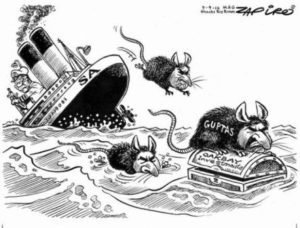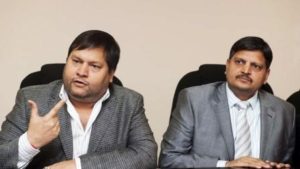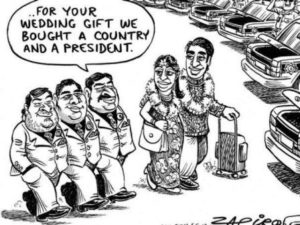South Africans have a new obsession – and it was made in India.
They’re called the Guptas, immigrants from India who have reached the apex of South Africa’s business world, and the centre of its politics. A Gupta TV channel, a Gupta newspaper, Gupta coal mines, Gupta-sponsored cricket stadiums – the family’s footprint extends far and wide.
Now, many South Africans ask whether they also have a Gupta-sponsored presidency. The controversy surrounding the family and its links to President Jacob Zuma appears to have contributed to the worst ever result for the African National Congress (ANC) in municipal elections last August.
The vote saw Africa’s oldest political party win just 54 per cent of the vote, down eight percentage points from 2011, and culminated in an event once thought impossible – an opposition member becoming mayor of Johannesburg.

No less significant was the loss of Tshwane (formerly Pretoria), the executive seat of government where the opposition Democratic Alliance (DA) won the most votes, for the first time ever. The shock was compounded by the loss of Nelson Mandela Bay (formerly Port Elizabeth), once an ANC stronghold, and Nkandla, in KwaZulu-Natal province, where Zuma built his infamous 255 million rand (Rs 1309 million) private homestead. As one commentator wryly observed, Zuma now lives, works and shops in opposition-led South Africa.
“Perceptions of President Jacob Zuma and his cronies as corrupt were a major ball and chain for the ruling party and contributed to the collapse of support in major urban areas in South Africa,” says David Maynier, who heads the DA’s finance portfolio. “It was clear voters believe they do not have jobs because of high levels of corruption in the allocation of short-term public works opportunities.”
Richard Pithouse, a senior researcher at the Unit for Humanities at Rhodes University, says the ANC’s poor election shows corruption is not merely an ‘elite’ preoccupation.
“What [the Guptas] represent to me – and to many people – is the extraordinarily brazen way in which Zuma has used the state to advance his own interests and the interests of his political connections at the expense of any kind of social project,” Pithouse says.
Some critics even suggest Zuma’s actions are turning South Africa back into a pariah state.
The Guptas are understood to have arrived in South Africa shortly before the country’s first democratic elections in 1994 to pursue the expected flood of new business opportunities.
Brothers Ajay and Atul were first to arrive, followed later by another brother, Rajesh.

Their father was reportedly a pious and hard-working man, respected within his community. By comparison, his sons are mostly regarded with suspicion, particularly by journalists grown cynical amid extreme income disparity, who jokingly refer to the Gupta’s walled Johannesburg compound as the unofficial seat of government.
The case against the Guptas has focused on perceived ‘sweetheart’ business deals related to their mining interests, or administrative favours.
There was an outcry over mines operating without the necessary water use licences; big questions over a massive contract to supply the state power utility with coal; and public consternation over permission granted to land a large party of wedding guests at a military air force base. Until recently, a key figure in the Gupta hierarchy was President Zuma’s son, Duduzane Zuma.

Julius Malema, firebrand ‘commander-in-chief’ of the Economic Freedom Fighters (EFF), a political party has been particularly hostile towards the Guptas. Malema and his fellow EFF members of parliament, who wear red overalls and mining hats to work as a show of working class solidarity, are often heard chanting ‘Zupta [Zuma and Gupta] Must Fall!’ in parliament before being carried out by the marshals.
Malema has also raised eyebrows by claiming Zuma transported 6 billion rand of ‘Gupta money’ to the UAE during a recent business trip – a claim dismissed as “preposterous and malicious” by the president’s office.
But if these controversies hurt the ‘Zupta’ alliance, the knock-out blow was the claim by deputy finance minister Mcebisi Jonas that the Guptas – and not Zuma – had offered him a cabinet position. Coming just a few months before the August poll, the claim was like a political atom bomb and prompted an investigation.
While the Guptas are relative newcomers to mud-slinging political limelight, Zuma has weathered worse , including accusations of corrupt arms deals and rape.
But some feel the furore around the Guptas is a continuation of South Africa’s obsession with race. The Guptas would not be the first high-profile Indians to endure bigotry of this kind. Anti-Indian remarks have surfaced periodically, including from within the ANC, targeting a community that nurtured many stalwarts of the anti-apartheid struggle in the land where Mahatma Gandhi began his journey against colonialism.
There are also those who claim the Gupta obsession is little more than jealousy because of the family’s remarkable rise from modest beginnings.
But if the Municipal elections were a barometer of public sentiment regarding Zuma and his inner circle, Guptas included, then public patience is clearly wearing thin. “Should the decision be made to persevere with Zuma as ANC leader, the electorate will second guess that decision in the 2019 general elections,” concludes Paul Hoffman, director of social justice lobby group Accountability Now.

[Paraphrased from reports by Bobby Jordan a senior reporter in South Africa]


